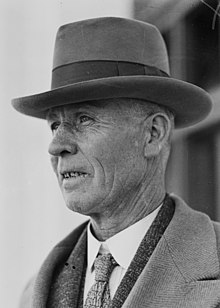John Joseph Cusack (8 August 1868 – 8 September 1956) was an Australian politician and businessman. He was a member of the Australian Labor Party (ALP) for most of his career and served in the New South Wales Legislative Assembly (1910–1917) and House of Representatives (1929–1931).
John Cusack | |
|---|---|
 | |
| Member of the Australian Parliament for Eden-Monaro | |
| In office 12 October 1929 – 19 December 1931 | |
| Preceded by | John Perkins |
| Succeeded by | John Perkins |
| Personal details | |
| Born | 8 August 1868 Yass, New South Wales |
| Died | 8 September 1956 (aged 88) Canberra, Australia |
| Nationality | Australian |
| Political party | Australian Labor Party |
| Spouse | Minnie Cassidy |
| Relations | Dymphna Cusack (niece) |
| Children | Two sons; a daughter |
| Occupation | Blacksmith |
Early life
editCusack was born at Bellevale near Yass, New South Wales and had some schooling in Yass. He was apprenticed at 15 to a blacksmith at Berrima. He learnt about coachbuilding in Sydney and returned to Yass in 1898 to marry Minnie Cassidy and start a coachbuilding business. He was elected to Yass Municipal Council and was mayor in 1904.[1]
Parliamentary career
editCusack established a branch of the Labor League (the predecessor of the Labor Party) in Yass in the 1890s. He represented Queanbeyan from 1910 to 1913,[2] and Albury from 1913 to 1917 in the New South Wales Legislative Assembly.[3] He was one of only four Labor members to hold the seat of Albury.[3] Following the ALP split of 1916, he was expelled from the party for failing to support a no-confidence motion against the new government formed by ALP defector William Holman. However, he was later readmitted.[1]
In 1929, Cusack was elected to the House of Representatives for Eden-Monaro,[4] surviving a petition by his defeated opponent John Perkins.[5] He attempted to switch to Cowper at the 1931 election but was defeated by Earle Page.[1] He stood unsuccessfully for several state elections up to 1953,[6] when he failed, at age 80, as an Independent,[7] to unseat the sitting Labor member for Burrinjuck, Billy Sheahan.[8][9] After the election, Cusack accused Sheahan, then NSW Attorney General, of "assist[ing] a masonic vendetta" against him.[10] In 1954, as a vigorous, though erratic, 85-year old, he contested the federal lower-house seat of Australian Capital Territory. He received around 3% of first preference votes[11] and lost his deposit.
Later life
editAfter his earlier electoral defeats, Cusack returned to his work as a blacksmith in Yass. He died in the old Canberra Hospital and was survived by his wife, three sons (Linton, Stan and Greg) and a daughter (Ursula). His son Stan established a successful furniture business in Canberra, following the development of the area as the Australian Capital Territory. Dymphna Cusack was his niece.[1] His great-granddaughter Catherine Cusack was elected as a Liberal Party member of the New South Wales Legislative Council in 2003.[6]
Notes
edit- ^ a b c d Nairn, Bede; Phillips, Nan. "Cusack, John Joseph (1868–1956)". Australian Dictionary of Biography. Canberra: National Centre of Biography, Australian National University. ISBN 978-0-522-84459-7. ISSN 1833-7538. OCLC 70677943. Retrieved 16 April 2019.
- ^ Green, Antony. "Elections for the District of Queanbeyan". New South Wales Election Results 1856-2007. Parliament of New South Wales. Retrieved 19 October 2020.
- ^ a b Green, Antony. "Elections for the District of Albury". New South Wales Election Results 1856-2007. Parliament of New South Wales. Retrieved 22 September 2019.
- ^ "1929 House of Representatives election: New South Wales". Psephos - Adam Carr's Election Archive. Retrieved 12 February 2022.
- ^ Perkins v Cusack [1930] HCA 3, (1930) 43 CLR 70.
- ^ a b "Mr John Joseph Cusack (1868–1956)". Former members of the Parliament of New South Wales. Retrieved 2 April 2019.
- ^ "Candidates for N.S.W. Elections". The Northern Star. 20 January 1953. p. 5. Retrieved 2 April 2019 – via Trove.
- ^ "The Hon. William Francis Sheahan (1895–1975)". Former members of the Parliament of New South Wales. Retrieved 2 April 2019.
- ^ "Cusack Again: Something Like an Election Speech". The Braidwood Dispatch and Mining Journal. 13 February 1953. p. 1. Retrieved 2 April 2019 – via Trove.
- ^ "Yass Court In Past "Political Brothel" Says J. J. Cusack". The Canberra Times. 21 January 1956. p. 4. Retrieved 2 April 2019 – via Trove.
- ^ "Notes From the City". The Scone Advocate. 26 March 1954. p. 7. Retrieved 2 April 2019 – via Trove.